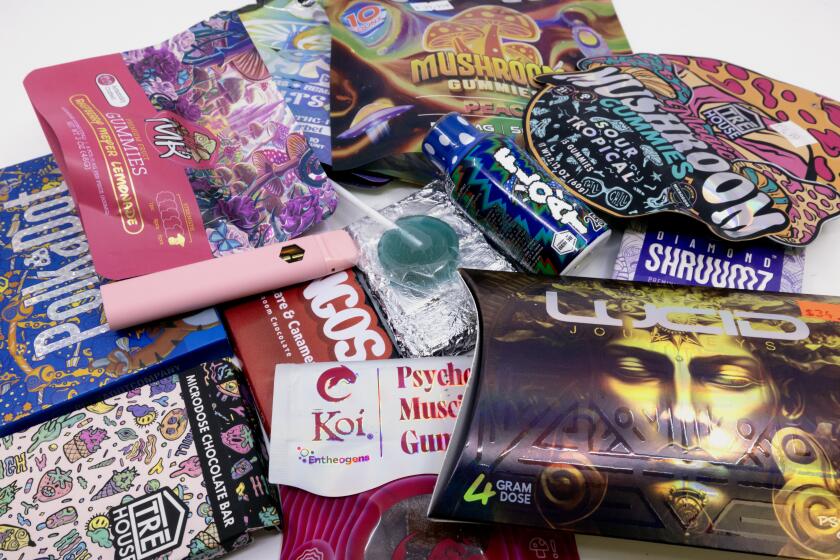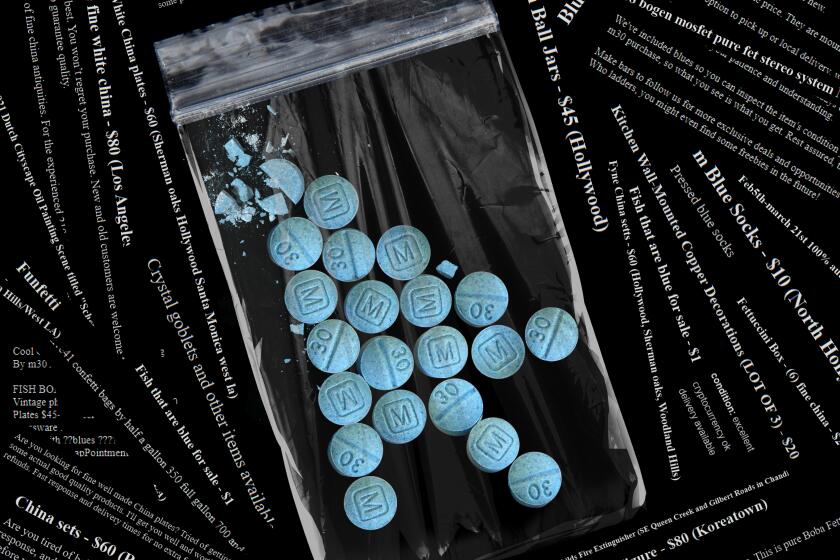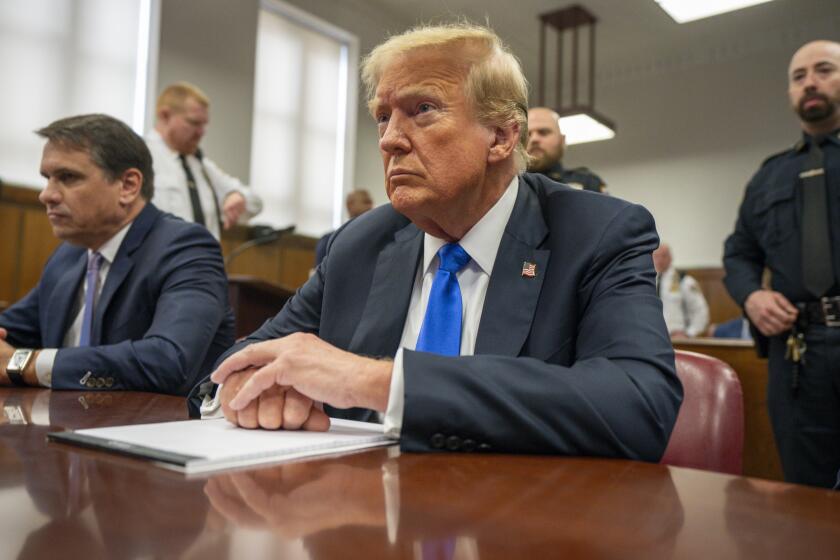With arrests in Matthew Perry death, is L.A.’s ketamine bubble about to burst?

They called her “the Ketamine Queen.”
Jasveen Sangha, authorities say, would sell ketamine — aka “Dr. Pepper” — in unmarked clear glass vials and tout it over Signal messages as high quality. She allegedly called her source “master chef” and “scientist.”
“She only deal[s] with high end celebs,” someone in her network allegedly texted a potential buyer. “If it were not great stuff she’d lose her business.”
One of Sangha’s most famous customers, federal prosecutors alleged Thursday, was Matthew Perry. Authorities say she sold about 50 vials of the drug to the actor for $11,000 — including the batch that led to his Oct. 28 death at 54.
U.S. Atty. Martín Estrada said an investigation had uncovered “a broad underground criminal network” responsible for distributing large quantities of ketamine to Perry and others. He announced charges against five people, including Sangha, 41, and two doctors, tied to Perry’s death.
They are facing an array of charges, including distribution of drugs resulting in death, according to an indictment unsealed Thursday.
Ketamine, a legal medication commonly used as an anesthetic, has gained popularity in recent years as both a clinical treatment for depression and a recreational drug. But Perry’s death and the arrests that followed have raised questions about whether a crackdown is looming.
Chocolate bars and gummies purporting to contain psilocybin mushrooms have become a common sight at smoke shops and illegal cannabis dispensaries across Southern California. But a Times investigation found they sometimes contain harmful or illegal compounds.
“I think what you’ve seen is that this is not the beginning but a continuation of an enforcement effort against synthetic drugs of all kinds,” Estrada said.
Estrada referenced the opioid fentanyl, which has fueled an epidemic of overdoses, and said authorities are “on a campaign to address this and send a message that if you sell drugs that result in the death of another person, the consequences will be severe.”
Across the country, the use of ketamine has boomed, something medical experts have said is being driven by clinics and online services offering intravenous treatments and prescriptions for in-home use — such as lozenges and nasal sprays — for ailments including depression, post-traumatic stress and substance use disorder.
Carol Gilson, a Texas-based psychotherapist and licensed clinical social worker supervisor, has facilitated more than 3,000 ketamine-assisted therapy sessions.
“If you look at the reports of people dying with ketamine in their systems, there is typically an underlying health issue and other things are the cause of death,” she said. “I think we are seeing that ketamine is being demonized right now.”
Perry, who was found dead in a hot tub at his home in Los Angeles, suffered from diabetes and chronic obstructive pulmonary disease, which can cause airflow blockage and breathing-related problems. He reportedly quit smoking only two weeks before his death and at one time smoked two packs of cigarettes a day.
Other factors that contributed to his death, according to the medical examiner, included drowning, coronary artery disease and the effects of buprenorphine, a medication used to treat opioid addiction.
Gilson said she has personally witnessed hundreds of people experience mental health turnarounds after taking ketamine in a therapeutic setting.
Bad actors like those who sold Perry ketamine that he took at home without supervision make it more difficult to get out the word of its therapeutic benefits, Gilson said.
“Ketamine is a valuable medicine. And my biggest fear is that it is in danger, and because of people like this,” she said. “There are people with medical licenses here that are expected to uphold an ethical code and they’re not. That is the issue here. Ketamine is not the villain.”
In recent years, ketamine prescriptions have increased along with a black market business for those self-medicating or using the drug recreationally.
Anne Milgram, administrator of the Drug Enforcement Administration, said Perry sought treatment for depression and anxiety and went to a local clinic “where he became addicted to intravenous ketamine.”
“When clinic doctors refused to increase his dosage, he turned to unscrupulous doctors who saw Perry as a way to make quick money,” Milgram said.
Authorities said Perry relied on a combination of medical professionals and street dealers, procuring and using the drug with help from his assistant.
When another accused illegal dealer, Salvador Plasencia, aka “Dr. P.,” learned in September 2023 that Perry was interested in getting ketamine, he reached out to another doctor, Mark Chavez, about purchasing the drug, according to the indictment.
“I wonder how much this moron will pay,” Plasencia, 42, allegedly texted Chavez. “Lets find out.”
From September to October 2023, the doctors distributed about 20 vials of ketamine to Perry in exchange for $55,000 in cash, according to Estrada. They charged Perry $2,000 for a vial that cost Chavez $12, authorities said.
“Plasencia saw this as an opportunity to profit off Mr. Perry,” Estrada said. “As a doctor, defendant Plasencia knew full well the danger of what he was doing.”
On one occasion, according to the indictment, Plasencia injected Perry with a large dose of ketamine that caused the actor to freeze up and his blood pressure to significantly spike. Despite that, he left additional vials of the drug with Perry’s live-in personal assistant, Kenneth Iwamasa, who is also charged.
“As Matthew Perry’s ketamine addiction grew, he wanted more and he wanted it faster and cheaper,” Milgram said. “That’s how he ended up buying from street dealers.”
In October, Iwamasa reached out to Eric Fleming, 54, to purchase ketamine.
Whereas other sites and apps almost eliminated drug postings after scrutiny by law enforcement, dealers on Craigslist seemingly remained active using code words.
When police searched Sangha’s home, Estrada said, they found what amounted to “a drug selling emporium.” There were around 80 vials of ketamine, thousands of pills containing methamphetamine, cocaine, and bottles of Xanax and other illegally obtained prescription drugs, authorities say.
Prosecutors say Sangha knew the dangers of ketamine since at least August 2019, when she allegedly sold the drug to Cody McLaury in the hours before his overdose death at age 33.
After a family member of McLaury’s texted Sangha saying that her ketamine had killed McLaury, Sangha allegedly searched on Google for “can ketamine be listed as a cause of death[?]” Sangha also faces charges in connection with McLaury’s death.
After Perry’s death, Estrada said, those arrested tried to cover up what they’d done.
Sangha allegedly told Fleming to delete all of their messages. Plasencia, according to Estrada, falsified medical records and notes to “try to make it look like what he was doing was legitimate.”
The records showed a medical treatment plan for Perry that claimed he was being given a maximum dose of 60 milligrams over 24 hours. In fact, prosecutors say, Perry was injecting far higher doses.
Fleming and Chavez, 54, each pleaded guilty this month to illegal drug distribution charges. Iwamasa, 59, also pleaded guilty and admitted to injecting Perry with ketamine without medical training, including performing several injections on the actor the day he died, authorities said. Chavez faces up to 10 years in prison, Iwamasa 15 years, and Fleming 25 years.
Plasencia faces up to 120 years in prison. Sangha faces up to life imprisonment.
Plasencia and Sangha were scheduled to be arraigned Thursday and were not available for comment.
“By filing these extensive and serious charges, we are sending a clear message. If you are in the business of selling dangerous drugs, we will hold you accountable for the deaths that you cause,” Estrada said.
Among the country’s community of ketamine users, news of Thursday’s charges was met with concern but little surprise.
Ren, a 32-year-old surgical tech who requested anonymity to discuss her medical history and what she characterized as substance abuse, said she does thousands of milligrams of ketamine each month, all prescribed by a New York-based online provider that mails the drug in lozenge form to her home in Salt Lake City.
She said she was shocked by how easy it was for her to get a prescription via the provider, which is one of a number of startups that have drawn scrutiny from the broader medical community because they dole out ketamine based on little more than brief online consultations.
“I could have said anything. I just said I had anxiety and they said, ‘You’re accepted.’ Then they mailed me ketamine,” Ren said. “I didn’t even talk to a doctor to get access to this for the first time. It was a clinic worker who didn’t even have a degree.”
She said she wasn’t surprised by reports that people have been harmed after becoming addicted to ketamine provided by street dealers and unscrupulous online clinics like the one of which she’s a patient.
Ren said she believes that some medical providers and dealers are more concerned about their bottom lines than safety.
“They don’t care,” she said. “They want my money.”
Staff writers Hannah Fry, Nathan Solis and Richard Winton contributed reporting.
More to Read
Sign up for Essential California
The most important California stories and recommendations in your inbox every morning.
You may occasionally receive promotional content from the Los Angeles Times.











